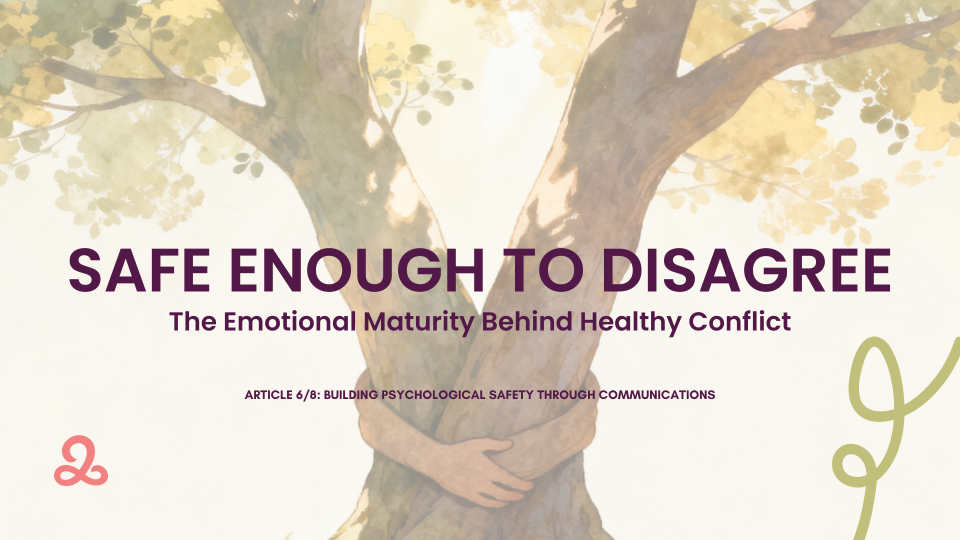There are no items in your cart
Add More
Add More
| Item Details | Price | ||
|---|---|---|---|

Picture this: You are planning a weekend getaway with your partner. They are rattling off plans out of excitement; sunrise hike, local market visit, museum tour, dinner reservations, evening concert... Your stomach tightens. It sounds exhausting but you remember the last time you suggested a slower pace and it turned into a whole different thing. So, you smile and say, "Sounds great!" while dreading the marathon over the weekend.
Sound familiar? We have all been there, swallowing our truth to keep the peace.
Welcome to the sixth installment of our eight-part series on "Building Psychological Safety through Communication." Here’s a quick refresher on what we’ve covered so far:
In Article 1, we examined the unspoken agreements that make people hesitant to speak up.
Article 2 revealed how language reflects and shapes culture.
Article 3 delved into microaggressions and their subtle yet harmful effects.
Article 4 reminded us that listening is a biological act, not just a polite gesture.
Today, we are tackling the elephant in every room: Why we choose silence over disagreement, even when it compromises our well-being.
Chances are, you have faced something very similar at work too. Your manager calls you for a meeting, you notice their eyes gleaming with their latest "game-changing" strategy. As they speak, you spot the loopholes big enough to consider another risk-assessment, you find the timelines unrealistic, the possible disapproval of the budget and all this being planned when your team is already stretched thin.
But do you speak up?
Probably not. You just nodded thoughtfully, maybe asked a clarifying question then walked out feeling that you have betrayed yourself. Later, during lunch break you might share your concerns with a trusted colleague, but the moment to make a difference has already passed.
Here's what's really happened: We are not conflict-avoidant, we are disconnection-avoidant. And there is a massive difference between both.
Think about the last time you bit your tongue. When your mother-in-law reorganized your kitchen "to be helpful." When your friend constantly shows up 30 minutes late. Or when your coworker takes credit of your innovative ideas. In each case, the calculation in your head wasn't "Is this worth arguing about?" It was "Is this worth risking our relationship?"
We have grown up believing that disagreement equals disconnection. That if we push back, we will be labelled "difficult", "negative" or "not a team player."
Let me share something extremely important today. The relationships and teams that thrive also have their own conflicts. The only difference is that they know how to disagree with care.
So, what does 'disagreeing with care' actually look like? Let me give you an example. My 5-year-old loves Pixar movies and out of curiosity, I started reading more about them, expecting to find this harmonious creative work culture full of mutual admiration. But what I discovered was surprising... Pixar Braintrust creates their animated movies through a radical process where directors present their films-in-progress to a group of peers who tear them apart (lovingly but honestly). Their discussion sessions are brutal. Directors walk out with pages of notes about what's not working. Yet this process has produced some of the most beloved films. Why? Because everyone knows the criticism isn't personal, it's shared with the sole intent of making the work better.
Ok another example, closer to home, my in-laws who were married for 30 years. They didn’t agree on everything (far from it). But I was always amazed watching them navigate a disagreement. There is respect, humour and genuine curiosity about each other's perspectives. They have certainly understood that disagreement doesn't mean danger.
So, what’s the secret ingredient of happiness?
What separates destructive conflict from constructive disagreement is “Emotional maturity” and before you roll your eyes at this buzzword, stay with me. You will get it in a minute. (You love examples, right?)
Reactive: "You always interrupt me! You never listen!"
Mature: "I notice I am feeling frustrated because I haven't been able to finish my thoughts. Could we try letting each other complete our points?"
Reactive: "That's a terrible idea."
Mature: "I have some concerns about that approach. May I share what I am worried about?"
Reactive: Silent treatment and passive-aggressive comments....
Mature: "I need some time to process this. Can we revisit it tomorrow?" (This one has been well-tested by me.)
Did those hit home? Want more? Here’s how emotional maturity sounds in everyday conflicts:
With Your Partner:
Instead of: "You never help with the kids' bedtime!"
Try: "I am feeling overwhelmed with bedtime routines. Can we come up with a routine that feels fair and easier for both of us? "
With Your Boss:
Instead of: "This deadline is impossible."
Try: "I want to deliver quality work on this project. Given the scope, I am concerned about the current timelines. Could we discuss priorities or additional resources?"
With Your Parents (my favourite):
Instead of: "You're always criticizing my choices!"
Try: "I value your thoughts and I also need you to trust that I am making thoughtful decisions. Can we find a balance?"
With Your Friend:
Instead of: "You're so selfish!"
Try: "I felt hurt when you cancelled our plans last minute. I understand things come up but I would appreciate more notice when possible."
The Words for Relationship Alchemy:
Here are some phrases that you can use to gain clarity of the situation and to choose better words as a response.
These phrases signal that this conversation is about understanding, not winning. In our polarized world, we have lost the art of productive disagreement. We either avoid conflict entirely (ghosting, anyone?) or we go solo (conflicts on WhatsApp group messages!!). But there is a middle path that we can hold our boundaries and our connections.
Did you notice a beautiful irony yet? When you create space for disagreement, you actually get less conflict, not more. Because issues get addressed when they are small and before they get blown up into resentments.
That irritation about dish arranging technique in kitchen does not become a symbol of disrespect. Neither does the concern about the project strategy that you manager spoke about become a firefighting situation at work.
Avoiding conflict will not keep your relationships safe but they will certainly keep them shallow. In reality, psychological safety means knowing you can show up as your whole self along with your disagreements and still belong.
The couples who make it together decade after decade are not the ones who never argue; they are the ones who ask the right question and choose the right words. The teams that excel are not the ones who are super collaborative, they are the ones who harmonize through discord. Same way, the friendships that endure are not the ones without friction, they are the ones that use friction to polish each other into better versions of themselves.
Any relationship that can't handle respectful disagreement is not actually that safe to begin with. And YOU certainly deserve relationships at work, at home and at ever place where you can be both honest and connected.
Now, a project (read: homework) for you. This week, try one brave disagreement at work. Start small if you feel more comfortable. Maybe, respectfully question a process that everyone knows is inefficient but no one mentions. Maybe, push back on a meeting that could be an email. Maybe, suggest an alternative approach when your gut tells you the current plan has gaps. Maybe, give that constructive feedback you’ve been sitting on for weeks or ask for the resources you actually need instead of just “making it work.” Then tell us how you felt and how things worked out for you.
Notice what happens. Notice your body's response, the other person's reaction and most importantly notice that the world did not end with your disagreement.
